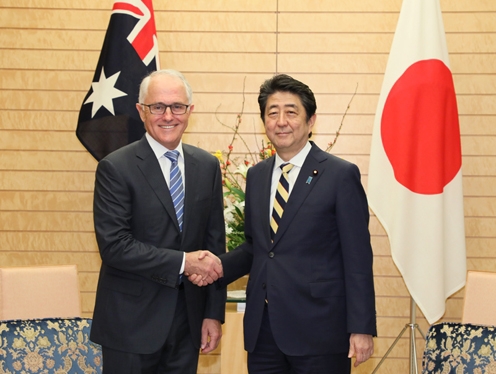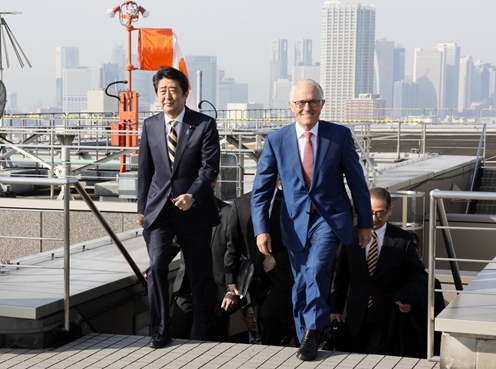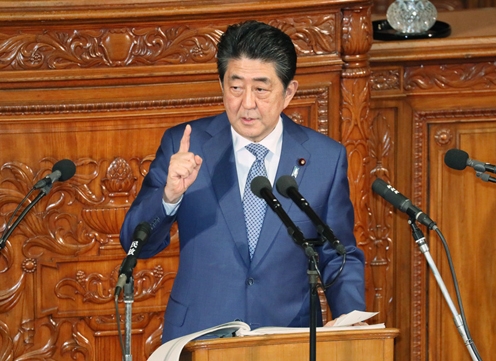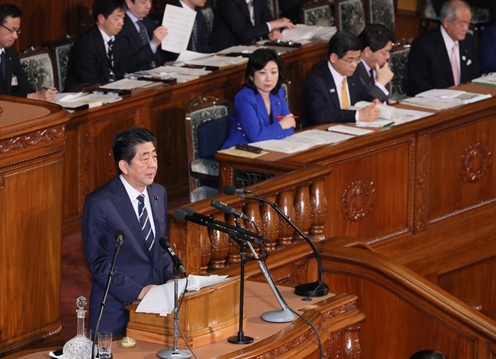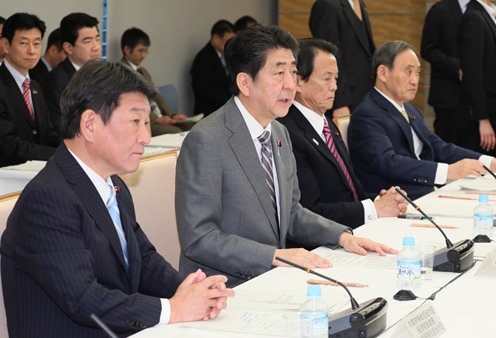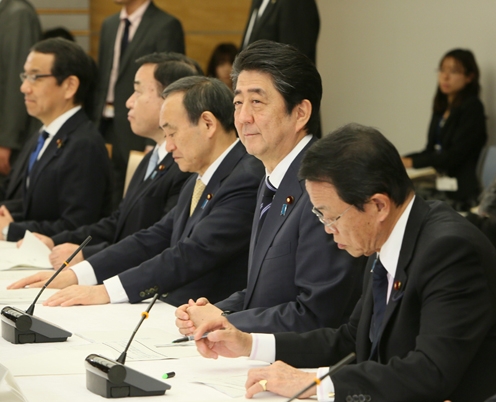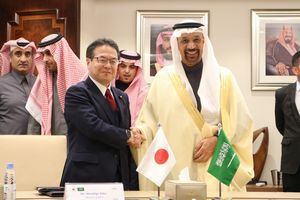Japan-Australia Summit Meeting and Other Events
Cabinet Secretariat, Thursday, January 18, 2018
[Provisional Translation]
On January 18, 2018, Prime Minister Shinzo Abe hosted a summit meeting and other events with the Hon. Malcolm Turnbull, Prime Minister of the Commonwealth of Australia.
The two leaders attended a salute and guard of honor ceremony, and then held a meeting. Thereafter, Prime Minister Abe hosted a special meeting of the National Security Council (meeting among four ministers).
At the beginning of the meeting, the Prime Minister said,
“Today, I am pleased to welcome Malcolm to this special meeting of the National Security Council.
Japan and Australia are special strategic partners that share universal values such as freedom, democracy, human rights, and the rule of law, as well as strategic interests.
As countries located in the Indo-Pacific region, Japan and Australia have an important responsibility to ensure the peace and prosperity of this region. In particular, as stabilizing forces in the seas, both our countries must further work together to create a free and open Indo-Pacific region.
Today, I look forward to discussing with Malcolm about Japan-Australia cooperation aimed at the realization of a free and open Indo-Pacific region.”
Thereafter, the leaders held a joint press announcement.
Lastly, the Prime Minister hosted a dinner banquet at the Prime Minister’s Official Residence and said in his address,
“I would like to extend a heartfelt welcome to the Hon. Malcolm Turnbull, Prime Minister of the Commonwealth of Australia, on his visit to Japan.
Today, Malcolm and I held an excellent exchange of views, including on the issues of North Korea. This evening I would like Malcolm to enjoy some time relaxing over Japanese cuisine.
With the New Year of 2018 upon us, Japan’s hosting of the Rugby World Cup is just around the corner in 2019. Japan has learned a lot from Australia with regard to rugby. Last year, the pool draw was held in Kyoto to determine the World Cup qualifiers, and I travelled to Kyoto for the event. I did the draw to determine which countries were in which group. I was praised as Japan was not drawn in the same group as Australia. My prediction is that Japan will make it through the preliminary round and hopefully face the Wallabies in the championship match. Actually let me correct my prediction to a more realistic one. I hope Japan will meet the Wallabies in the knockout stage and not the championship match.
The year after next Japan is set to host the Tokyo Olympic and Paralympic Games. Today, we are joined by Ms. Naoko Takahashi, winner of a gold medal at the Sydney Olympic Games. Many Japanese people remember the excitement from this time. I anticipate that a great deal of excitement will be produced by the upcoming Tokyo Games as well. In Japan, host towns will warmly welcome Australia’s national teams. Kobe and Nishiwaki cities in Hyogo Prefecture are among the cities to be host towns. I hope Australia will turn the hospitality of the host towns into power to win a large number of gold medals.
This evening we are joined by people who have supported the friendly relations between our two countries in various facets, including politics, business, academics, arts, sports, and grassroots activities. Thanks to all of your efforts we enjoy a very amicable friendship between our two countries. I would like to take this opportunity to extend my appreciation to all of you and ask for your ongoing cooperation in the future. I would now like to give a toast to the good health of Prime Minister Turnbull and everyone with us today, as well as the continued development of our bilateral relations. Cheers.”
Visit to the JGSDF Narashino Training Area by the Leaders of Japan and Australia
Cabinet Secretariat, Thursday, January 18, 2018
[Provisional Translation]
On January 18, 2018, Prime Minister Shinzo Abe visited the JGSDF Narashino Training Area together with the Hon. Malcolm Turnbull MP, Prime Minister of the Commonwealth of Australia.
Exchange of Congratulatory Messages between Mr. Shinzo Abe, Prime Minister of Japan and H.E. Mr. Joko Widodo, President of the Republic of Indonesia, on the occasion of the 60th anniversary of the establishment of diplomatic relations between Japan and Indonesia
Foreign Affairs, Saturday, January 20, 2018
1. In 2018, Japan and the Republic of Indonesia mark the 60th anniversary of the establishment of diplomatic relations.
2. To commemorate the 60th anniversary, Prime Minister Shinzo Abe exchanged congratulatory messages with President Joko Widodo.
3. In his message, Prime Minister Abe Mentions the progress between the two countries in a wide range of fields such as economy, disaster risk reduction and people-to-people exchanges, and expresses his hope for further advancement of the bilateral relations on the occasion of this milestone year.
Policy Speech by Prime Minister Shinzo Abe to the 196th Session of the Diet
Cabinet Secretariat, Monday, January 22, 2018
[Provisional Translation]
On January 22, 2018, Prime Minister Shinzo Abe delivered a policy speech to the 196th Session of the Diet during the plenary sessions of the House of Representatives and the House of Councillors.
Plenary Session of the House of Representatives
Cabinet Secretariat, Wednesday, January 24, 2018
[Provisional Translation]
On January 24, 2018, Prime Minister Shinzo Abe attended the plenary session of the House of Representatives.
Meeting of the Council on Economic and Fiscal Policy
Cabinet Secretariat, Tuesday, January 23, 2018
[Provisional Translation]
On January 23, 2018, Prime Minister Shinzo Abe held the 1st meeting in 2018 of the Council on Economic and Fiscal Policy at the Prime Minister’s Office.
At the meeting, discussions were held on the medium- to long-term economic and fiscal outlook, and this year’s topics of discussions in the Council on Economic and Fiscal Policy.
Based on the discussion, the Prime Minister said,
“Firstly, we discussed the medium- to long-term economic and fiscal outlook.
The medium- to long-term estimates presented today were created based on the discussions within the Council on Economic and Fiscal Policy that we need a realistic estimate, which takes into account past performance and recent economic conditions. In a scenario where medium- to long-term economic growth is projected to exceed 2% in real terms and exceed 3% in nominal terms, the estimates forecast that a primary balance surplus will be achieved in the second half of the 2020s. However, these estimates do not reflect our efforts to advance expenditure reform.
Based on these medium- to long-term estimates, we must determine, by this summer, when we will achieve a primary balance surplus, and decide on a concrete plan for doing so.
I would like the Council members from the private sector, as well as the relevant ministers, including Minister Motegi and Minister Aso, to thoroughly discuss these matters.
Secondly, we discussed this year’s topics of discussions of the Council on Economic and Fiscal Policy.
Council members from the private sector have raised the following issues, all of which are of great importance: an exit from deflation and growth in disposable income to support that, especially the realization of a 3% wage increase; a review of the effectiveness of the expenditure and revenue reforms toward achieving fiscal soundness, and the formulation of plans to achieve a surplus in the primary balance; the materialization of Society 5.0, in response to accelerating global changes; as well as the realization of a social security system oriented to all generations and the establishment of new frameworks toward regional revitalization.
I hope that we can deepen discussions toward the formulation of the Basic Policies scheduled for this summer.”
Ministerial Council on the Monthly Economic Report and Other Relative Issues
Cabinet Secretariat, Friday, January 19, 2018
On January 19, 2018, Prime Minister Shinzo Abe attended a meeting of the Ministerial Council on the Monthly Economic Report and Other Relative Issues at the Prime Minister's Office.
Regarding the assessment of the current state of the Japanese economy, the January Monthly Economic Report states that “The Japanese economy is recovering at a moderate pace.”
Furthermore, in regard to short-term prospects, the Report states, “The economy is expected to continue recovering, supported by the effects of the policies, while the employment and income situation is improving. However, attention should be given to the uncertainty in overseas economies and the effects of fluctuations in the financial and capital markets.”
Press Conference by Foreign Minister Taro Kono
Foreign Affairs, Friday, January 19, 2018
Visit to Japan by Minister for Europe and Foreign Affairs Jean-Yves Le Drian of the French Republic
Mr. Taro Kono, Minister for Foreign Affairs: French Minister for Europe and Foreign Affairs Le Drian will pay a working visit (invitation by Minister for Foreign Affairs) to Japan from January 26 to 29 upon my invitation.
During his stay in Japan, we are holding the Fourth Japan-France Foreign and Defense Ministers’ Meeting together with Defense Minister Onodera and French Minister for the Armed Forces Parly. Additionally, Minister Le Drian and I are holding the Seventh Japan-France Foreign Ministers’ Strategic Dialogue.
Japan hopes to strengthen the “exceptional partnership” between our two countries since this year marks the 160th anniversary of Japan-France friendship. Japonism 2018 will also take place in France, and in this regard we hope to deepen strategic and cultural ties between Japan and France.
First Year of the Trump Administration
Reporter: Tomorrow marks one year since the inauguration of the Trump administration in the US. Please explain your impression of the first year and how Japan intends to interact with the US considering domestic and overseas criticism of the Trump administration.
Minister Kono: President Trump and Prime Minister Abe have held frequent summit meetings and telephone talks, and the Japan-US Alliance has never been stronger.
In the face of the North Korean crisis, Japan will continue to support the US policy of keeping all options on the table. At the recent meeting in Vancouver, the international community was able to send a very strong message that nuclear weapons cannot be accepted on the Korean Peninsula, and that the international community should apply maximum pressure to ensure that North Korea follows a path of denuclearization. Japan and the US intend to continue collaborating to offer their full support.
Escort of Japanese Fishing Boat to Russia
Reporter: It is reported that a Japanese fishing boat operating in Nemuro Bay in Hokkaido was escorted to Russia yesterday. Please explain what you know thus far and the Japanese Government’s response.
Minister Kono: I understand that an investigation is taking place regarding an alleged false entry in the operating ledger. The government continues to look into the facts and plans to respond appropriately.
Comments by North Korea’s Foreign Press Secretary
Reporter: I have a question about North Korea. Local media reported comments by North Korea’s Foreign Press Secretary criticizing Prime Minister Abe’s obsessive calls for stronger pressure on North Korea during his overseas visit. What is your view of these comments?
Minister Kono: I believe North Korea is reacting to the very strong message of the international community agreeing to put maximum pressure on North Korea.
North-South Working-Level Talks
Reporter: I would like to ask about the dialogue between the Republic of Korea (ROK) and North Korea. Working-level talks have been taking place regarding participation in the Olympic Games. This includes forming a joint team in some events. The discussions appear to be moving forward at a fairly quick pace. What is your view of the current state of the North-South dialogue?
Minister Kono: The current North-South dialogue is limited to the Olympic Games. As the Games begin soon in the first half of February, it seems decisions about the format of participation must be made fairly quickly in order for it to actually happen.
Reporter: Concerns have emerged about appeasement by the Moon Jae-in Government in this dialogue process. What is your view of these concerns?
Minister Kono: The ROK participated in the meeting in Vancouver and confirmed in a Japan-US-ROK Foreign Ministers’ Meeting and in other venues that maximum pressure should be applied, that North Korea has become highly skilled in its efforts to avoid sanctions, and that Japan, the US, and the ROK should take the lead in providing technical assistance so that sanctions can be implemented effectively. We intend to proceed with these efforts.
Abductions Issue
Reporter: I would like to return to the topic of North Korea. The above-mentioned criticism also included an assertion that the abductions issue has already been resolved. Please explain your thoughts on this point.
Minister Kono: We maintain the position contained in the Stockholm Agreement with North Korea. We steadily aim to ultimately resolve the nuclear, missile, and abductions issues.
Prime Minister Abe’s Participation in the PyeongChang Olympic Games Opening Ceremony
Reporter: I have a question about the PyeongChang Olympic Games. Foreign Minister Kang of the ROK, directly invited Prime Minister Abe to visit the ROK for the PyeongChang Olympic Games. What is your view on Prime Minister Abe attending the PyeongChang Olympic Games opening ceremony?
Minister Kono: I think Prime Minister Abe will make this decision in light of the Diet schedule and other matters.
First Year of the Trump Administration
Reporter: I would like to ask about the first year of the Trump administration. While the relationship is excellent in regard to security issues related to North Korea, substantial differences exist in areas that are closely tied to Japan, such as the Trans-Pacific Partnership (TPP) and the Paris Agreement. What is your view of these destabilizing factors?
Minister Kono: Although it is very regrettable that the US left the TPP, discussions are taking place with Ambassador Lighthizer, United States Trade Representative, on development of rules between Japan and the US for high-quality trade in the Asia-Pacific region. Japan and the US can still accomplish various things in the field of trade. At the recent climate change summit in France, the US participated at state and corporate levels. This activity suggests that there is considerable commitment to the Paris Agreement within the US.
Chinese Military Submarine in the Contiguous Zone of the Senkaku Islands
Reporter: A Chinese submarine was recently submerged once in the contiguous zone surrounding the Senkaku Islands. Please explain your thoughts on this incident. What is your analysis of China’s aim?
Minister Kono: I would like to refrain from commenting on China’s aim. We intend to firmly request that China not repeat such action.
Foreign Ministers’ Meeting for Related Countries on North Korea
Reporter: I have a question about the meeting in Canada. Secretary of Defense Mattis stated that the US has a war plan for dealing with North Korea. What is your analysis of this comment?
Minister Kono: I would like to refrain from discussing what took place at the dinner meeting.
Japan-US Nuclear Energy Agreement
Reporter: I have a question about the Japan-US Nuclear Energy Agreement. As you also mentioned in an appearance on a BS satellite TV program, you have stated that the framework contains uncertainty because it could be stopped with a notification. You also commented that Japan has an obligation to fully explain its situation to the international community in the plutonium usage plan. Please explain specifically how you plan to proceed with this effort.
Minister Kono: There will be close coordination within the Government.
Reporter: Will it just be a minor adjustment to the framework? How about the automatic extension framework?
Minister Kono: Nothing has been decided yet.
METI Minister Seko Visits the Kingdom of Saudi Arabia and the United Arab Emirates
METI, Tuesday, January 16, 2018
On January 14(Sun.)and 15(Mon.), 2018, Mr. Hiroshige Seko, Minister of Economy, Trade and Industry, visited Riyadh, the Kingdom of Saudi Arabia, and Abu Dhabi, the United Arab Emirates(UAE).
In Riyadh, he held a meeting with Custodian of the Two Holy Mosques King Salman Bin Abdulaziz Al-Saud, King of the Kingdom of Saudi Arabia, and related ministers, and also attended the Saudi-Japan Vision 2030 Business Forum.
In Abu Dhabi, he exchanged views with H.H. General Sheikh Mohammed bin Zayed Al Nahyan, Crown Prince of Abu Dhabi, government dignitaries and other officials. Moreover, he participated in the World Future Energy Summit 2018(WFES 2018), and attended a signing ceremony concluding a facility agreement between the Japan Bank for International Cooperation(JBIC)and the Abu Dhabi National Oil Company(ADNOC).
1. The Kingdom of Saudi Arabia(January 14)
(1)Meetings with government dignitaries to promote cooperation under the Saudi-Japan Vision 2030
Japan and Saudi Arabia have been advancing cooperation under the Saudi-Japan Vision 2030 concluded during King Salman's visit to Japan in March 2017, which acts as a compass for our strategic partnership. Minister Seko confirmed the steady progress in the cooperation during his courtesy call on King Salman and bilateral meetings with major economic ministers. At each meeting, both sides agreed that Japan and Saudi Arabia will further expand, enrich and accelerate the cooperation.
At the meeting with King Salman, Minister Seko explained that Japan will not change its earnest intention to support the country in the economic and social system reform that Saudi Arabia is advancing, and both sides shared the recognition that cooperation under the Saudi-Japan Vision 2030 is significant and strategic.
At the meeting with H.E. Mr. Khalid A. Al-Falih, Minister of Energy, Industry and Mineral Resources, who is taking initiative in advancing Japan-Saudi cooperation, both sides discussed the progress made in the past efforts, and based on the progress, both sides agreed that the two countries will continue collaboration through further accelerating momentum and that they will coordinate schedules to hold the next ministerial-level meeting of the Joint Group for Saudi- Japan Vision 2030 in Japan as early as possible. Moreover, both sides discussed cooperation on diversification of industries and energy.
At the meeting with H.E. Dr. Majid Bin Abdullah Al Qasabi, Minister of Commerce and Investment, Minister Seko expressed his gratitude for the successful completion of the Saudi-Japan Vision 2030 Business Forum. Following this, both sides agreed on the advancement of cooperation concerning support measures in the field of SMEs, an area on which Saudi Arabia places emphasis.
(2)Attending the Saudi-Japan Vision 2030 Business Forum
Minister Seko attended the Saudi-Japan Vision 2030 Business Forum held on the same date, organized by the Saudi Arabian General Investment Authority(SAGIA), the Japan External Trade Organization(JETRO)and the Japan Cooperation Center for the Middle East(JCCME). The forum was a great success, attended by 67 Japanese companies and 130 Saudi Arabian companies. It consisted of an opening ceremony for celebrating the inauguration of the Saudi-Japan Vision Office in Riyadh, where experts will work to promote business between the two countries, an exchange ceremony for six documents of cooperation between companies in Japan and Saudi Arabia, and the granting of three licenses to Japanese companies for developing business in Saudi Arabia.
2. The UAE(January 15)
(1)Attending the World Future Energy Summit 2018(WFES 2018)
Minister Seko participated in the WFES 2018 and exchanged views with Crown Prince Mohammed, H.E. Sultan Ahmed Al Jaber, Chief Executive Officer of the Abu Dhabi National Oil Company(ADNOC)and the Minister of State, and other government dignitaries in the UAE. Through this, he encouraged Abu Dhabi to allow Japanese companies to continue to possess oil concessions concerning offshore oilfields in Abu Dhabi, which will expire in March 2018. As seen in Crown Prince Mohammed bin Zayed Al Nahyan's expression of his understanding of and particular gratitude for Japan's efforts and future cooperation, Japan received positive responses from Abu Dhabi.
Following this, Minister Seko toured the Japan Pavilion at the site, in which Japan exhibited cutting-edge technologies, including hydrogen producing technologies, robotics using myoelectric analyses and resource search efforts in space, as well as Japanese companies' products related to renewable energy.
(2)Attending a signing ceremony for concluding a facility agreement between JBIC and ADNOC
Minister Seko and ADNOC CEO Jaber witnessed a signing ceremony concluding a facility agreement between JBIC and ADNOC that was held at the site of the WFES. Under the agreement, JBIC will provide necessary funds to ADNOC to secure Japanese companies to import crude oil in a steady manner. This is the fifth funding of JBIC to ADNOC to secure Japan's long-term, steady access to crude oil.
Press Conference by Foreign Minister Taro Kono
Foreign Affairs, Tuesday, January 23, 2018
North Korea situation
Reporter: I would like to ask a question related to North Korea. The other day it was confirmed that a ship thought to be a tanker under the Dominican Republic flag was pulled up alongside a North Korean tanker and this was probably a part of efforts to evade sanctions. I think that at the related meetings in Canada before this you proposed strengthening measures against this, so what do you think about this kind of thing occurring in that context and how are you going to respond?
Foreign Minister Kono: At the meeting in Vancouver, Canada, I pointed out that North Korea has become very skillful at evading the sanctions. Regarding my response to “ship-to-ship transfers,” the international community is in agreement that we should firmly help each other while attempting to prevent these “ship-to-ship transfers.”
This concerns the details of the operation of the warning and surveillance activities regarding the individual cases, so I would like to refrain from commenting any further.
Reporter: Ships under a variety of flags are making contact with those ships that are thought to be North Korean, so some observers have pointed out that cracking down on them is probably not possible with surveillance alone. What do you think about that?
Foreign Minister Kono: The reality is that North Korea’s methods for evading sanctions have become very skillful, so I think that we must respond to that in a variety of forms. I intend to firmly deal with this by doing what is possible with the agreement of the international community.
Reporter: This is another question about North Korea. According to some media reports, at the recent meeting in Canada, Foreign Minister Kang Kyung-wha of the Republic of Korea stated a positive attitude toward resuming humanitarian assistance, and in response to that Japan and the United States took the lead in expressing the response that such a step would be premature or too soon. It could be pointed out that resumption of humanitarian assistance would of course be premature, or perhaps that it should be considered separately, but what do you think about that?
Foreign Minister Kono: I would like to refrain from talking about the parts of the Vancouver meeting that were not open to the public. The international community agreed that it is necessary to apply maximum pressure on North Korea now, and has sent messages to that effect in the co-chairs’ summary and others, so I think there is no way forward other than applying the maximum pressure on North Korea by the international community now.
Reporter: About the “ship-to-ship transfers,” in the case for example that the site where the cargo is being transferred is photographed, does Japan have any intention of submitting the photographs to the United Nations and other institutions?
Foreign Minister Kono: I will not talk about the details of the operations.
Visit to China by Foreign Minister Kono
Reporter: Regarding the schedule for your visit to China, I think you have shown a willingness to visit China for a long time, and I think that the focus will be on how far agreement can be secured regarding the holding of the Japan-China-ROK Trilateral Summit. What kinds of exchanges are you expecting on your visit to China?
Foreign Minister Kono: The visit to China itself has not been finalized yet, so I cannot say anything about that. But regarding the Japan-China-ROK Trilateral Summit, I think we will proceed with the adjustment of the schedule with a view to holding the summit as soon as possible.
Reporter: You have been saying for a very long time that you would like to visit China at an early stage. What matters would you like to confirm on the spot at the foreign ministers’ meeting as minister?
Foreign Minister Kono: This year is a milestone year for the Japan-China relations, so I would like to promote efforts to strengthen the relations in a various way. I also believe it is important for Japan and China to work together on international and global issues, so I would like to discuss what Japan and China can do about such matters working together side by side.
Reporter: In your foreign policy speech yesterday, regarding the problem of the East China Sea, you pointed out that you cannot accept unilateral change to the status quo. Is it your intention to make this matter a topic of conversation as well?
Foreign Minister Kono: I would like to discuss the Japan-China relations and a variety of challenges.
Reporter: In the case of a visit to China, will a meeting with Premier Li Keqiang also be arranged?
Foreign Minister Kono: Nothing has been decided about the visit to China yet.
Reporter: Don’t you think the problem of China’s nuclear submarines entering the contiguous zone will become an obstacle to the Japan-China relations?
Foreign Minister Kono: I intend to discuss the Japan-China relations and a variety of issues.
Minutes of the Monetary Policy Meeting on December 20 and 21, 2017
Bank of Japan, Friday, January 26, 2018
A Monetary Policy Meeting of the Bank of Japan Policy Board was held in the Head Office of the Bank of Japan in Tokyo on Wednesday, December 20, 2017, from 2:00 p.m. to 3:27 p.m., and on Thursday, December 21, from 9:00 a.m. to 11:39 a.m.
Statement on Monetary Policy
Bank of Japan, Tuesday, January 23, 2018
At the Monetary Policy Meeting held today, the Policy Board of the Bank of Japan decided upon the following.
1. Yield curve control
The Bank decided, by an 8-1 majority vote, to set the following guideline for market operations for the intermeeting period.
The short-term policy interest rate:
The Bank will apply a negative interest rate of minus 0.1 percent to the Policy-Rate Balances in current accounts held by financial institutions at the Bank.
The long-term interest rate:
The Bank will purchase Japanese government bonds (JGBs) so that 10-year JGB yields will remain at around zero percent. With regard to the amount of JGBs to be purchased, the Bank will conduct purchases at more or less the current pace -- an annual pace of increase in the amount outstanding of its JGB holdings of about 80 trillion yen -- aiming to achieve the target level of the long-term interest rate specified by the guideline.
The Policy Board also decided, by a unanimous vote, to extend by one year the deadlines for new applications for such measures as the Fund-Provisioning Measure to Stimulate Bank Lending, the Fund-Provisioning Measure to Support Strengthening the Foundations for Economic Growth, and the Funds-Supplying Operation to Support Financial Institutions in Disaster Areas affected by the Great East Japan Earthquake and by the Kumamoto Earthquake.
Outlook for Economic Activity and Prices
Bank of Japan, Wednesday, January 24, 2018
Japan's economy is likely to continue expanding on the back of highly accommodative financial conditions and underpinnings through the government's past stimulus measures, with overseas economies continuing to grow at a moderate pace, and maintain growth at a pace above its potential mainly through fiscal 2018. In fiscal 2019, the economy is expected to continue expanding, although the growth pace is projected to decelerate due to a cyclical slowdown in business fixed investment and the effects of the scheduled consumption tax hike.
The consumer price index (CPI, all items less fresh food) has continued to show relatively weak developments, excluding the effects of a rise in energy prices, mainly against the background that firms' wage- and price-setting stance has remained cautious.
Nonetheless, medium- to long-term inflation expectations are projected to rise as firms' stance gradually shifts toward raising wages and prices with an improvement in the output gap continuing. As a consequence, the year-on-year rate of change in the CPI is likely to continue on an uptrend and increase toward 2 percent.
Comparing the current projections with the previous ones, both the projected growth rates and the projected rates of increase in the CPI are more or less unchanged.
With regard to the risk balance, upside and downside risks to economic activity are generally balanced, and risks to prices are skewed to the downside. On the price front, the momentum toward achieving the price stability target of 2 percent is maintained as the
output gap is expected to continue improving and medium- to long-term inflation expectations are projected to rise gradually; however, the momentum is not yet sufficiently firm, and thus developments in prices continue to warrant careful attention.
As for the conduct of monetary policy, the Bank will continue with "Quantitative and Qualitative Monetary Easing (QQE) with Yield Curve Control," aiming to achieve the price stability target of 2 percent, as long as it is necessary for maintaining that target in a stable
manner. It will continue expanding the monetary base until the year-on-year rate of increase in the observed CPI (all items less fresh food) exceeds 2 percent and stays above the target in a stable manner. The Bank will make policy adjustments as appropriate, taking account of developments in economic activity and prices as well as
financial conditions, with a view to maintaining the momentum toward achieving the price stability target.

























